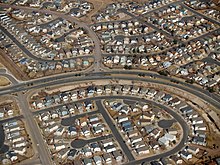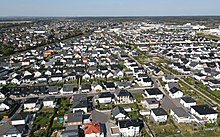Suburb
![]()
The title of this article is ambiguous. For other meanings, see Suburb (disambiguation).
![]()
This article or subsequent section is not sufficiently supported by evidence (e.g., anecdotal evidence). Information without sufficient evidence may be removed in the near future. Please help Wikipedia by researching the information and adding good supporting evidence.
A suburb is a settlement located on the outskirts of a larger city. It is usually part of a densification area and has little or no central importance for the conurbation. In recent decades, there has been a trend of population migration from inner cities to suburbs, particularly in Europe and North America. In Germany, this has meant that large cities have often run into financial difficulties due to a lack of tax revenue and have moved to incorporate their suburbs as a political redevelopment concept and/or to improve their population statistics (subsidies).
While in Germany the suburbs of numerous cities have meanwhile often been incorporated and thus become city districts, in many other countries, such as the USA or Australia, suburbs are still independent. In France, parts of the banlieues are considered social problem zones (see riots in France 2005). The situation is similar in some outlying districts of US cities. Due to the high population density of the continent, suburbs in Europe - especially in Germany - are not only purely residential settlements built in recent years (dormitory towns), but often also "naturally" evolved independent villages and towns with their own, sometimes historic, centres.
At least in Germany, suburbs are often well connected to the city centre by public transport, e.g. S-Bahn, which is particularly important for commuters and students who work or study in the city.

Aerial view of a suburban settlement in the USA near Colorado Springs

Aerial view of a suburban settlement in Germany near Cologne
See also
- Elbe suburbs
- Surrounding Area
- Suburb (History)
- Suburban
- Satellite city
- Satellite Town
- Suburbanization
Search within the encyclopedia